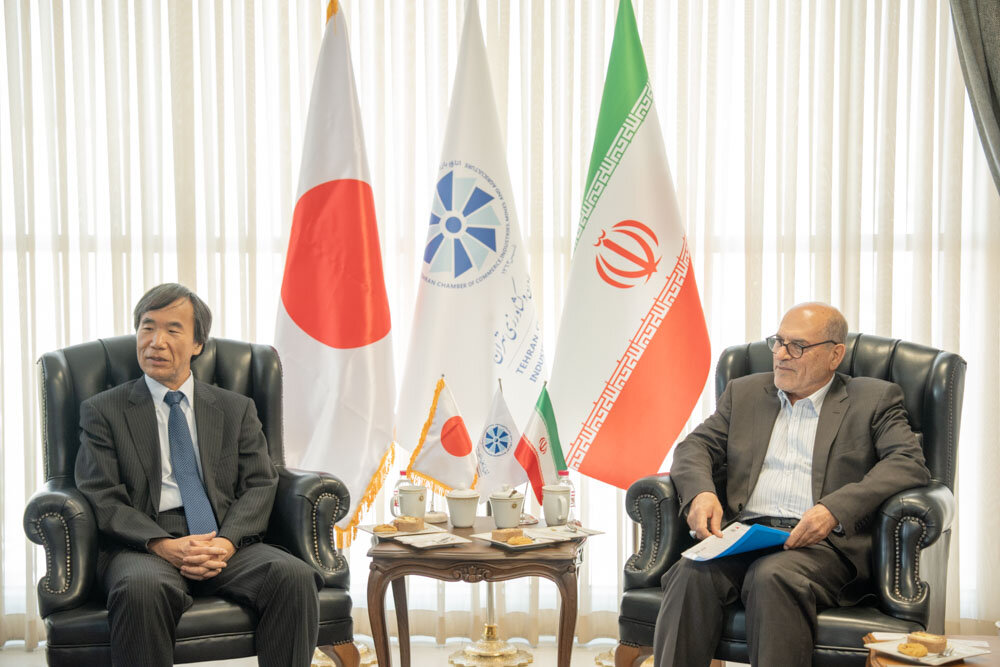Iranian, Japanese private sector officials discuss boosting economic ties

TEHRAN - Makhmoud Najafi-Arab, Head of the Tehran Chamber of Commerce, Industries, Mines and Agriculture (TCCIMA) met with Maekawa Nobutaka, Executive Vice President of the Japan External Trade Organization (JETRO), to explore avenues for strengthening trade and economic relations between Iran and Japan, with a focus on the private sector.
The TCCIMA head also emphasized the importance of leveraging Japanese companies’ expertise and technical and managerial know-how.
During the meeting, the two sides reviewed potential areas of collaboration and discussed the broader outlook for joint efforts to enhance bilateral economic relations.
According to a statement by the TCCIMA, Najafi-Arab acknowledged the longstanding history of positive economic and investment cooperation between Iran and Japan. However, he noted that international sanctions have led Japanese companies to act more cautiously in their trade engagements with Iran, which in turn has slowed economic ties in recent years.
He stressed that the current situation is temporary and suggested that Japanese firms could begin positioning themselves to expand their role in Iran’s economy. He proposed continuous engagement between the Tehran Chamber and JETRO’s Tehran office to identify shared economic opportunities.
Najafi-Arab announced the Tehran Chamber’s readiness to sign a cooperation agreement with JETRO and underlined promising sectors for bilateral engagement, including pharmaceuticals, medical equipment, automotive manufacturing, education, and startups. He also proposed establishing formal ties between the Tehran Chamber and the Tokyo Chamber of Commerce.
Also, in another meeting between Maekawa Nobutaka, and the head of Iran’s Trade Promotion Organization (TPO) on May 26, both sides reaffirmed their interest in enhancing bilateral trade relations.
In the meeting, TPO, Head Mohammad-Ali Dehqan Dehnavi congratulated Maekawa Nobutaka on the 96th anniversary of diplomatic ties between Iran and Japan, and described cooperation between the two trade organizations as effective.
“We are eager to benefit from your expertise in the field of trade,” he said.
Dehnavi, who also serves as deputy minister of Industry, Mining and Trade, added that Iran seeks to draw on Japan’s experience in product promotion and supportive trade mechanisms.
Highlighting the Iranian market’s appreciation for Japanese quality, Dehnavi said Iran would welcome JETRO technical experts to help facilitate knowledge exchange.
Nobutaka, the JETRO special envoy, acknowledged the longstanding friendship between the two nations but expressed concern over the impact of sanctions on trade relations.
“We are truly disheartened by the current state of our economic ties and are seeking to revise our approach in Iran to achieve more promising outcomes,” he said.
He reaffirmed Japan’s continued interest in investing in Iran, saying the country’s motivation to pursue investment opportunities remains unchanged.
Nobutaka also stressed the commitment of both the Japanese government and private sector to engage with Iran, noting that JETRO’s presence in the country would be maintained to support Japanese companies interested in doing business there.
Also present at the meeting, Amir Roshanbakhsh, the deputy for international business development at the TPO, said Iranians have already benefited from Japan’s industrial expertise.
“We’ve built significant capacity in technical and engineering services. Training and technology transfer fall outside the scope of sanctions, which has allowed us to preserve and consolidate this potential within the country,” he added.
Meanwhile, during a meeting with senior Iranian officials on May 29, Japanese ambassador to Iran said his country is interested in enhancing bilateral cooperation with Iran, particularly in maritime-based economic development.
Ambassador Tamaki Tsukada conveyed Japan’s interest in maritime investment opportunities during talks with Gholamreza Kazemian, Deputy Minister for Urban Planning and Architecture, and Saeed Rasouli, Deputy Minister and Head of the Ports and Maritime Organization (PMO).
Tsukada said the Japanese government would be informed of the proposals presented by Iran, including potential areas for partnership and investment linked to Iran’s maritime economy and the development of the Makran coastal region.
Kazemian outlined two key initiatives: the maritime-oriented development strategy and the Makran coastal development plan, which aim to establish industrial hubs, expand agriculture, enhance transport and infrastructure, and boost population settlements in line with Iran’s national spatial planning framework.
He described the maritime strategy as an opportunity to advance trade, economic, and commercial ties and to help bridge regional development gaps.
EF/MA
